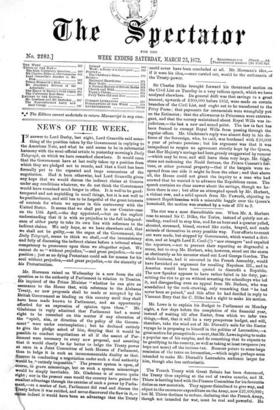Mr. Horsman raised on Wednesday in a new form the
old question as to the authority of Parliament in relation to Treaties. He inquired of the Prime Minister "whether he can give an aiwurance to the House that, with reference to the Alabama Treaty, no new proposals shall be made or accepted by the British Government as binding on this country until they shall have been made known to Parliament, and an opportunity afforded for an expression of opinion upon them." Mr. Gladstone in reply admitted that Parliament had a moral right to be consulted on this matter if any alteration of the "spirit, aim, or direction of the policy of the Govern- ment" were under contemplation ; but he declined entirely to give the pledge asked of him, denying that it would be possible to conduct negotiations at all if the assent of Par- liament were necessary to every new proposal, and asserting that it would clearly be far better to lodge the Treaty power at once in a Joint Committee of both Houses of Parliament, than to lodge it in such an incommensurable duality as that. Suncess in conducting a negotiation under such a dual authority would be," entirely impossible." The present system is open, of course, to grave miscarriage, but on such a system miscarriage would be simply inevitable. Mr. Gladstone is of course quite right ; nor in the present case would the country have gained the smallest advantage through the exercise of such a power by Parlia- kt,—as a matter of fact, Parliament did read and discuss the ty before it was ratified, and never discovered the flaw in it,— ess indeed it would have been an advantage that the Treaty
could never have been concluded at all. Mr. Horsman's idea,— if it were his idea,—once carried out, would be the euthanasia of the Treaty-power.


































